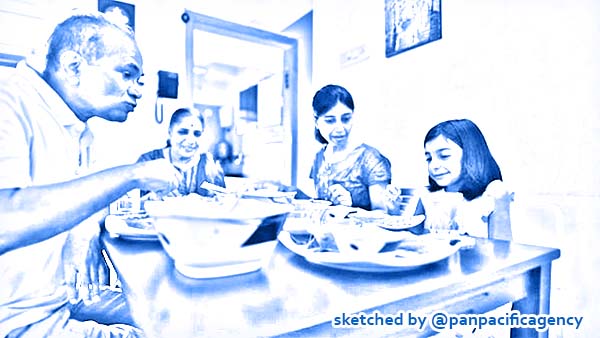[Analytics] How India calculates the value of women’s housework

India family. IMAGE COPYRIGHT: GETTY IMAGES. Sketched by the Pan Pacific Agency.
A newly formed political party in India, launched by a film star, has promised salaries to housewives if voted to power. A prominent MP welcomed the idea, saying it will “monetise the services of women homemakers, enhance their power and autonomy” and create a near-universal basic income. Soutik Biswas specially for the BBC.
This is a compelling debate, especially at a time when women are losing ground in paid work. All around the world, women spend time in unpaid work – ranging from a maximum of 345 minutes per day in Iraq to 168 minutes per day in Taiwan, according to International Labour Organisation. On average, men spent 83 minutes in unpaid care work while women spent three times more at 265 minutes.
So should housewives be paid wages for doing largely thankless household chores?
India’s 160 million homemakers, like many of their counterparts in the rest of the world, clean, tidy, cook, wash up and manage family finances. They fetch food, water and firewood, and give care to children and their in-laws. They spend 297 minutes a day doing domestic work, compared to 31 minutes by men. A quarter of men are engaged in unpaid chores, compared to four-fifths of women.
Legal scholar Gautam Bhatia has argued that unpaid housework is “forced labour”. Arpan Tulsiyan, a research scholar at Delhi University, says it is “important to recognise the value of unpaid domestic work”.
What is not well known is that for more than half-a-century, Indian courts have actually been awarding compensation for unpaid work done by homemakers. But only after their death.
Prabha Kotiswaran, a professor of law and justice at King’s College London, has looked at about 200 cases between 1968 and 2021 filed under an Indian law that regulates all road transport vehicles and imposes penalties for rash driving, among other things.
She found that the country’s courts had developed a “path-breaking” legal framework concerning “robust wages for housework”: judges have put a value on unpaid work of women who have died in road accidents and awarded compensation to their dependants.
In calculating the value of housework, judges have looked at opportunity cost – which is something that is given up in order to do something else – of a woman’s decision to work at home, considered minimum wages for skilled and unskilled workers, taken into account educational qualifications of the deceased woman, and adjusted compensations after accounting for age and considering whether she had children or not.
In December, a court awarded a compensation of 1.7 million rupees ($23,263; £17,019) to the family of a 33-year-old homemaker who died in a road accident, after fixing her notional salary at 5,000 rupees a month.
The Supreme Court has awarded lump sum amounts up to 9,000 rupees a month as a notional income for a deceased housewife aged between 34-59 years with a lower amount for elderly women, aged between 62-72. Compensation decreased with age as courts believed she would be doing less childcare work as children grew up.
Wherever possible, the judges have tried to keep pace with inflation. In one judgement, the judges viewed marriage as an “equal economic partnership” so that the homemaker’s salary would be half of the husband’s salary.
The earliest case of such compensation found by Prof Kotiswaran was a ruling from 1966. In that case, the court ruled that the cost to the husband of “maintaining” his wife would have been equal to her imagined salary, so no compensation was awarded to him.
Some of the compensation payments calculated by the courts have been “paltry”, Prof Kotiswaran says, but “the principle itself of the recognition of unpaid work on par with an occupation is quite noteworthy”.
It begs the question: if a family can be compensated for unpaid work done by a woman after she has died, why not pay women when they are alive?
Lawyers may be able to use these judgments to “trigger developments in constitutional law and family laws to recognise the unpaid work of housewives in normal times, rather than only at times of disruption”, Prof Kotiswaran says. Paying wages to women doing unpaid work at home would also boost India’s declining female labour participation rate.
“I am not arguing only for salaries for housewives, but for a broader wages-for-housework movement. Organisations like UN Women are too focused on how unpaid work is an obstacle to paid work,” Prof Kotiswaran says. “The focus seems to be on how to get more women into paid work. The Indian women’s movement is focused on many laudable issues but is not asking the big question here about labour performed within marriage.”
There’s also no mass mobilisation of housewives over the issue, she says. “Most elites think that salaries for housewives is unworkable at best and regressive at worst, but there is a case for a broader political argument about recognition of housework. I do think that women in millions of Indian households, subject to the drudgery of maintaining home, will welcome a proposal for salaries.”
There are a lot of questions about how this can be achieved.
Should the money for the wages come from cash transfers, state subsidies or a universal basic income? Should family laws be changed to recognise women’s unpaid work? Should men performing housework also be remunerated? Should transgender women be included in these payment schemes? What could be the unintended consequences of salaries for housewives?
“We need a more sustained conversation on all of these aspects before mobilising for salaries for housewives,” says Prof Kotiswaran.